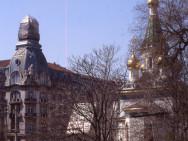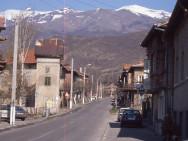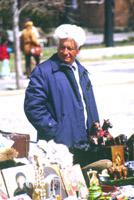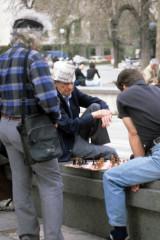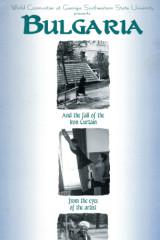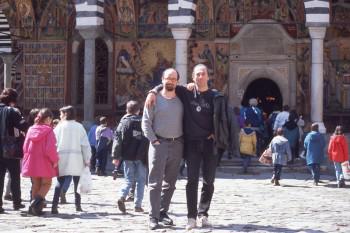Stalinka
The path that led to the creation of “Stalinka” began with the few steps a friend and I had taken into a new theater we happened to pass on the street, “Theater Alternative.” Recognizing that we spoke English, the artistic director, Madelyn Tcholakova—who had also studied acting in London- stopped us to talk. Thus began a relationship that has continued to this day and which inspired the writing of the play, “Stalinka.”
Madelyn was a very well known actor during the Communist period and later she became a director as well as a producer. During the changes, she was one of the leading advocates for shutting down the state-run theaters. Her “Theater Alternative” was one of the few private theaters to attempt to address the new way of doing and it succeeded until the economic situation in the country deteriorated even further.
Madelyn is also a member of that generation of people in Bulgaria who refer to themselves as the lost generation. They were old enough to see the changes coming, but unable to do anything about them. Feeling responsible somehow, they now often feel obliged to do what they can to try to help with the changes that are overwhelming everyone. Madelyn inspired me to write about her country and the remarkable human epic that occurred when people’s lives changed 180-degrees overnight.
What has struck me most about today’s Bulgaria was how after the fall of Communism, suddenly the history of the country only went back to 1991. For whatever reason, the Communist period was seen as something removed from the general progression of Bulgarian society and it was not anything anyone was really talking about except in an almost cartoon-like manner. As I began to work with students at the National Academy of Film and Theater, one of the professors spoke to me of a form of nihilism she believed her students possessed. To me, it seemed logical and almost instinctual that people should turn in on themselves as a response to the shifting nature of their external environment and the lack of historic context in which they viewed their cultural identity.
I began an oral history project with the students that was done in conjunction with the development of my play. The project’s stated goal was to get information about the Communist period from parents and other elders which would assist me in writing the play. The unspoken objective, however, was to provide an opportunity for the students to break down another wall that had been built up between them and their past and to facilitate conversation between the generations.
Also compelling was the plight of some of the older generation of people in Bulgaria whose world suddenly changed overnight, but who were unable to make the transition along with it. They had to remain committed to their out-of-date beliefs or admit that their lives had been absurd on some level. There was an anger and a bitterness that makes all the sense in the world, although I often found it to be misdirected towards friends, family, or sometimes towards whomever the current president of the United States might be.
It was also interesting to see how just how some of the social changes were embraced in a place where there hadn’t been any history of those things. For example, the concept of freedom is a very complex idea that has taken free societies generations of court battles and social considerations to ultimately define. When my Bulgarian friends visited me in the United States, I had a very difficult time explaining to them why, in our free country, they were not allowed to drink beer in the back of my pickup as we maneuvered our way through rush hour traffic in downtown Washington D.C. Of even greater concern was the idea of a no-smoking area, which—as anyone who has visited Bulgaria will attest—makes absolutely no sense to a Bulgarian.
One director provided me with an example that sums up a lot of the difficulties experienced in many of the Eastern European countries during this time of cultural transition. The director asked two of her students to get up on stage and improvise the concept of “freedom.” There was a long pause between the two, until one finally turned to the other and punched him in the face. The other one struck back and soon the class was watching a bloodied and bruised demonstration of “freedom.”
My play, “Stalinka” was inspired by all of these things. The character who goes by this name is the old woman who has always lived among them who they all call “Auntie,” although nobody knows how, or if, she is related to anybody. She always seems about to die, but yet she continues to somehow eat everything in sight. She demands things that cause people to act in an absurd manner. If she had been a boy at birth, the good Communist family would have been called him “Stalin” Instead, she is “Stalinka”, a metaphor both of the lingering effect of the Communist oligarchy and of a history that will not be confronted.
